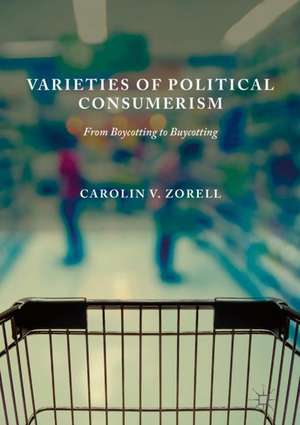Varieties of Political Consumerism: From Boycotting to Buycotting
Autor Carolin V. Zorellen Limba Engleză Hardback – 20 oct 2018
| Toate formatele și edițiile | Preț | Express |
|---|---|---|
| Paperback (1) | 381.00 lei 43-57 zile | |
| Springer International Publishing – 29 dec 2018 | 381.00 lei 43-57 zile | |
| Hardback (1) | 473.49 lei 43-57 zile | |
| Springer International Publishing – 20 oct 2018 | 473.49 lei 43-57 zile |
Preț: 473.49 lei
Preț vechi: 557.05 lei
-15% Nou
Puncte Express: 710
Preț estimativ în valută:
90.60€ • 94.85$ • 74.97£
90.60€ • 94.85$ • 74.97£
Carte tipărită la comandă
Livrare economică 07-21 aprilie
Preluare comenzi: 021 569.72.76
Specificații
ISBN-13: 9783319910468
ISBN-10: 3319910469
Pagini: 198
Ilustrații: XV, 188 p. 12 illus., 8 illus. in color.
Dimensiuni: 148 x 210 mm
Greutate: 0.49 kg
Ediția:1st ed. 2019
Editura: Springer International Publishing
Colecția Palgrave Macmillan
Locul publicării:Cham, Switzerland
ISBN-10: 3319910469
Pagini: 198
Ilustrații: XV, 188 p. 12 illus., 8 illus. in color.
Dimensiuni: 148 x 210 mm
Greutate: 0.49 kg
Ediția:1st ed. 2019
Editura: Springer International Publishing
Colecția Palgrave Macmillan
Locul publicării:Cham, Switzerland
Cuprins
1. Revising Our Understanding of Political Consumerism.- 2. Perspectives on Political Consumerism.- 3. Explaining Political Consumerism.- 4. Political Consumerism at the Country Level.- 5. Political Consumerism at the Individual Level.- 6. Political Consumerism as a Multi-Layered Process.
Notă biografică
Carolin V. Zorell is Researcher at the University of Mannheim, Germany. Her research interest lies especially in the political and socio-psychological background of social interaction, and the inquiry of how context and personal characteristics form political participation and social cooperation.
Textul de pe ultima copertă
This book provides an analysis of the politics of consumption and how the ‘educated consumer’ plays a vital role in advancing responsible market practices and consumption. Based on a comprehensive interdisciplinary perspective, it explores the extent, drives and links of boycotting, buycotting, labelling schemes and Corporate Social Responsibility (CSR) in 20 European countries. A central question addressed is whether macro-societal patterns of orientation concerning the roles of the state, companies and citizens can explain individual and cross-national differences in boycotting and buycotting. As the book shows, there is not one type of ‘political consumer’, but several, and their occurrence is directly connected to national variations of labelling schemes and Corporate Social Responsibility. Consumers need reference points and information on the political backgrounds of purchases, and policy makers must address that need through political measures which fit to the national patterns in views about cooperation and market relationships.
Carolin V. Zorell is Researcher at the University of Mannheim, Germany. Her research interest lies especially in the political and socio-psychological background of social interaction, and the inquiry of how context and personal characteristics form political participation and social cooperation.
Caracteristici
Expands the present understanding of political consumerism through two original quantitative studies Highlights the relevance of political consumerism in the future world of politics Considers intrinsic factors other than the expression of value orientations
